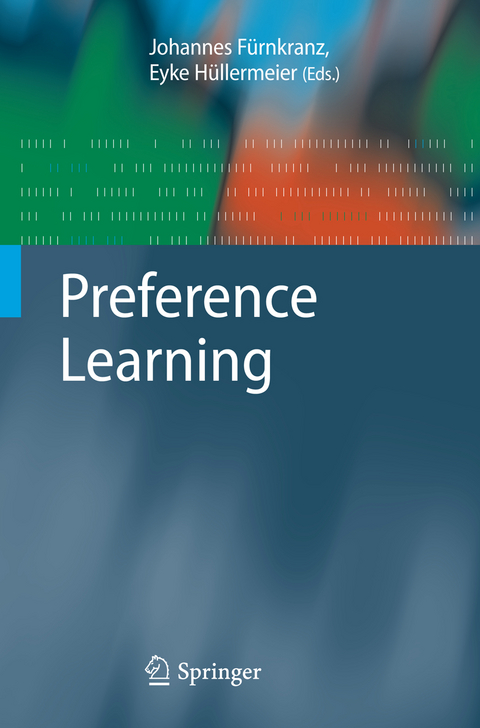
Preference Learning
Springer Berlin (Verlag)
978-3-642-42230-0 (ISBN)
The topic of preferences is a new branch of machine learning and data mining, and it has attracted considerable attention in artificial intelligence research in previous years. It involves learning from observations that reveal information about the preferences of an individual or a class of individuals. Representing and processing knowledge in terms of preferences is appealing as it allows one to specify desires in a declarative way, to combine qualitative and quantitative modes of reasoning, and to deal with inconsistencies and exceptions in a flexible manner. And, generalizing beyond training data, models thus learned may be used for preference prediction.This is the first book dedicated to this topic, and the treatment is comprehensive. The editors first offer a thorough introduction, including a systematic categorization according to learning task and learning technique, along with a unified notation. The first half of the book is organized into parts on label ranking, instance ranking, and object ranking; while the second half is organized into parts on applications of preference learning in multiattribute domains, information retrieval, and recommender systems.The book will be of interest to researchers and practitioners in artificial intelligence, in particular machine learning and data mining, and in fields such as multicriteria decision-making and operations research.
Prof. Dr. Johannes Fürnkranz is a professor of knowledge engineering at the Technische Universität Darmstadt. He has chaired and served on the boards of the main journals and conferences in this field. His research interests include inductive rule learning, preference learning, game playing, web mining, and data mining in social science.
Preference Learning: An Introduction.- A Preference Optimization Based Unifying Framework for Supervised Learning Problems.- Label Ranking Algorithms: A Survey.- Preference Learning and Ranking by Pairwise Comparison.- Decision Tree Modeling for Ranking Data.- Co-regularized Least-Squares for Label Ranking.- A Survey on ROC-Based Ordinal Regression.- Ranking Cases with Classification Rules.- A Survey and Empirical Comparison of Object Ranking Methods.- Dimension Reduction for Object Ranking.- Learning of Rule Ensembles for Multiple Attribute Ranking Problems.- Learning Lexicographic Preference Models.- Learning Ordinal Preferences on Multiattribute Domains: the Case of CP-nets.- Choice-Based Conjoint Analysis: Classification vs. Discrete Choice Models.- Learning Aggregation Operators for Preference Modeling.- Evaluating Search Engine Relevance with Click-Based Metrics.- Learning SVM Ranking Function from User Feedback Using Document.- Metadata and Active Learning in the Biomedical Domain.- Learning Preference Models in Recommender Systems.- Collaborative Preference Learning.- Discerning Relevant Model Features in a Content-Based Collaborative Recommender System.- Author Index.- Subject Index
From the reviews:
"The book looks at three major types of preference learning: label ranking, instance ranking, and object ranking. ... chapters contain case studies and actual experiments to illustrate the claims made within. ... this is a useful book in an emerging and important area, and hence would be of interest to machine learning researchers. The book is quite readable to that audience, despite a heavy emphasis on formal treatment." (M. Sasikumar, ACM Computing Reviews, September, 2011)
| Erscheint lt. Verlag | 28.9.2014 |
|---|---|
| Zusatzinfo | IX, 466 p. |
| Verlagsort | Berlin |
| Sprache | englisch |
| Maße | 155 x 235 mm |
| Gewicht | 724 g |
| Themenwelt | Informatik ► Datenbanken ► Data Warehouse / Data Mining |
| Informatik ► Theorie / Studium ► Künstliche Intelligenz / Robotik | |
| Schlagworte | Artificial Intelligence • Data Mining • Information Retrieval • Instance ranking • Label ranking • learning • machine learning • Multicriteria decision-making • object ranking • Operations Research • preference learning • Preference prediction • Reasoning • Recommender Systems • Supevised learning |
| ISBN-10 | 3-642-42230-6 / 3642422306 |
| ISBN-13 | 978-3-642-42230-0 / 9783642422300 |
| Zustand | Neuware |
| Informationen gemäß Produktsicherheitsverordnung (GPSR) | |
| Haben Sie eine Frage zum Produkt? |
aus dem Bereich


